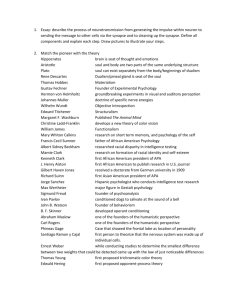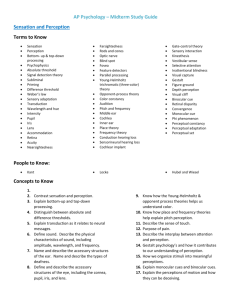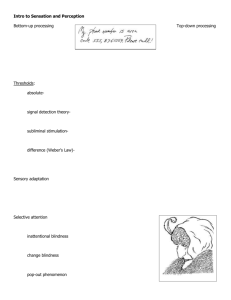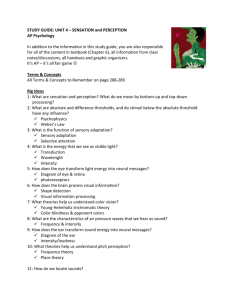MICHAELMAS TERM 2008
advertisement
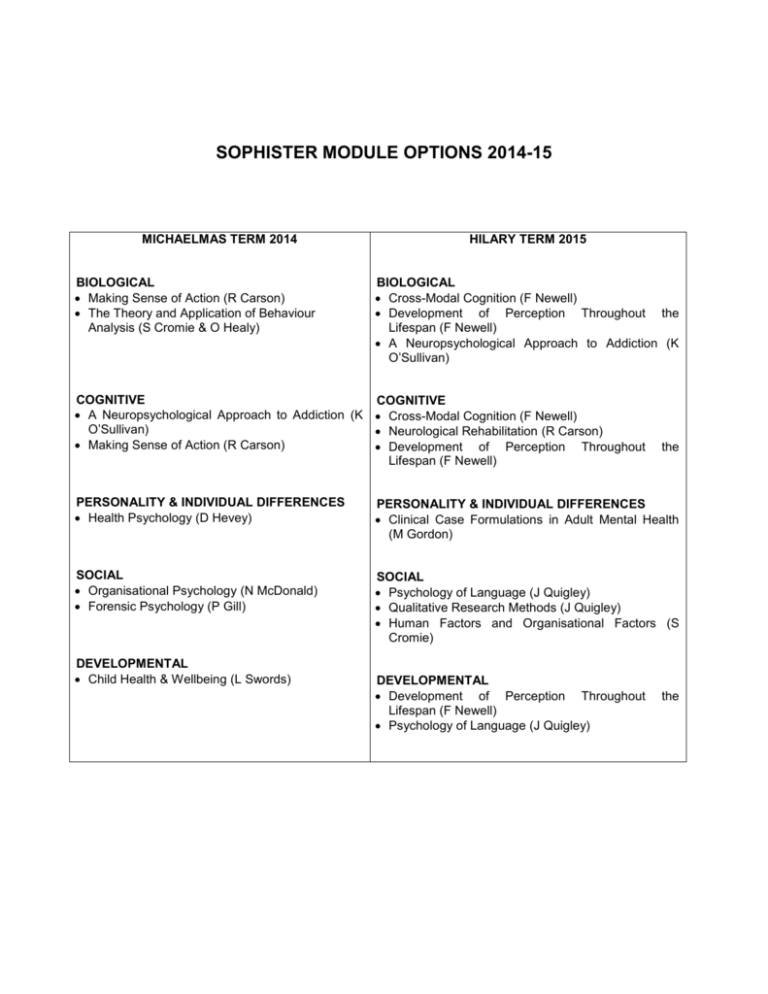
SOPHISTER MODULE OPTIONS 2014-15 MICHAELMAS TERM 2014 BIOLOGICAL Making Sense of Action (R Carson) The Theory and Application of Behaviour Analysis (S Cromie & O Healy) HILARY TERM 2015 BIOLOGICAL Cross-Modal Cognition (F Newell) Development of Perception Throughout the Lifespan (F Newell) A Neuropsychological Approach to Addiction (K O’Sullivan) COGNITIVE COGNITIVE A Neuropsychological Approach to Addiction (K Cross-Modal Cognition (F Newell) O’Sullivan) Neurological Rehabilitation (R Carson) Making Sense of Action (R Carson) Development of Perception Throughout Lifespan (F Newell) the PERSONALITY & INDIVIDUAL DIFFERENCES Health Psychology (D Hevey) PERSONALITY & INDIVIDUAL DIFFERENCES Clinical Case Formulations in Adult Mental Health (M Gordon) SOCIAL Organisational Psychology (N McDonald) Forensic Psychology (P Gill) SOCIAL Psychology of Language (J Quigley) Qualitative Research Methods (J Quigley) Human Factors and Organisational Factors (S Cromie) DEVELOPMENTAL Child Health & Wellbeing (L Swords) DEVELOPMENTAL Development of Perception Throughout Lifespan (F Newell) Psychology of Language (J Quigley) the BIOLOGICAL Making Sense of Action (Prof. Richard Carson) This module will cover approaches to understanding perception and cognition, from the perspective that these functions can only be considered sensibly in an action context. Consideration will be given to exemplars drawn from various areas of psychology that serve to illustrate the role of movement in aspects of perception and cognition regarded traditionally as being independent of the means of effect. The module will deal with observations defined at the level of behaviour. It will also include evidence drawn from the neurosciences - concerning brain activity subserving perception, cognition and motor function, that bears upon these issues. In addition, consideration will be given to some of the related philosophical questions that are raised. The student is also introduced to the possibility that intervention strategies thus informed, may be used to maintain or enhance cognitive performance. A Neuropsychological Approach to Addiction (Dr. Katriona O’Sullivan) Drug addiction is a syndrome at the centre of which lies impaired control over behaviour, craving and tolerance. This course aims to provide students with a framework for understanding the processes that are involved in drug addiction, placing particular emphasis on the cognitive, emotional and neurobiological aspects of addiction. The aim is to promote an understanding of different addiction types (e.g. cocaine, heroin, and nicotine) while addressing some of the theoretical issues that are prevalent in the addiction literature (e.g., is drug use motivated by drug liking? Is addiction limited to psychoactive substances?). Cross-Modal Cognition (Prof. Fiona Newell) This course will offer both an investigation of perception in each of the main human sensory modalities and an integrated examination of how the senses work together. Different approaches to the study of multi-sensory integration and new topics within this area will be studied including brain imaging, neural responses to objects and faces, selective attention across different modalities, and perceptual plasticity. Development of Perception throughout the Lifespan (Prof. Fiona Newell) This course will involve a study of the capability, development and decline of the main sensory systems throughout the lifespan. The course will begin with a review of sensory and perceptual development in utero and the consequences of the rapid cortical development within the first years of life on visual, tactile and auditory perception. The effects of sensory impairment on perceptual development in the intact senses will also be discussed. Whilst the course will also focus on normal perception in adulthood, particular emphasis will be placed on the effects of ageing on sensory and perceptual capabilities. The Theory and Application of Behaviour Analysis (Prof. Sam Cromie & Prof. Olive Healy) Much of psychology concerns itself with what is happening inside the head or brain. Behaviour Analysis, by contrast, insists that much of the explanation for behaviour, and the leverage to change it, can be found in the analysis of the context in which it develops and occurs. This option explores the theory and basic principles of behaviour analysis and its application to clinical populations. It includes: the three-term contingency as a basic unit of analysis; single-subject designs, functional analysis, applied interventions, verbal behaviour; rule-governed behaviour; stimulus equivalence; self-control. COGNITIVE Making Sense of Action (Prof. Richard Carson) This module will cover approaches to understanding perception and cognition, from the perspective that these functions can only be considered sensibly in an action context. Consideration will be given to exemplars drawn from various areas of psychology that serve to illustrate the role of movement in aspects of perception and cognition regarded traditionally as being independent of the means of effect. The module will deal with observations defined at the level of behaviour. It will also include evidence drawn from the neurosciences - concerning brain activity subserving perception, cognition and motor function, that bears upon these issues. In addition, consideration will be given to some of the related philosophical questions that are raised. The student is also introduced to the possibility that intervention strategies thus informed, may be used to maintain or enhance cognitive performance. A Neuropsychological Approach to Addiction (Dr. Katriona O’Sullivan) Drug addiction is a syndrome at the centre of which lies impaired control over behaviour, craving and tolerance. This course aims to provide students with a framework for understanding the processes that are involved in drug addiction, placing particular emphasis on the cognitive, emotional and neurobiological aspects of addiction. The aim is to promote an understanding of different addiction types (e.g. cocaine, heroin, and nicotine) while addressing some of the theoretical issues that are prevalent in the addiction literature (e.g., is drug use motivated by drug liking? Is addiction limited to psychoactive substances?). Cross-Modal Cognition (Prof. Fiona Newell) This course will offer both an investigation of perception in each of the main human sensory modalities and an integrated examination of how the senses work together. Different approaches to the study of multi-sensory integration and new topics within this area will be studied including brain imaging, neural responses to objects and faces, selective attention across different modalities, and perceptual plasticity. Development of Perception throughout the Lifespan (Prof. Fiona Newell) This course will involve a study of the capability, development and decline of the main sensory systems throughout the lifespan. The course will begin with a review of sensory and perceptual development in utero and the consequences of the rapid cortical development within the first years of life on visual, tactile and auditory perception. The effects of sensory impairment on perceptual development in the intact senses will also be discussed. Whilst the course will also focus on normal perception in adulthood, particular emphasis will be placed on the effects of ageing on sensory and perceptual capabilities. Neurological Rehabilitation (Prof. Richard Carson) This module will cover approaches to meeting the needs of people with neurological disorders and progressive neurological diseases. As the production of purposeful goal directed movement pervades all aspects of behaviour, there will be a specific focus upon the physical, psychological and social consequences of movement dysfunction. The module will deal with the scientific principles underlying neurological rehabilitation, including motor control and learning. The student is also introduced to intervention strategies that are designed to maintain or re-establish functional capability, such as brain-computer interfaces, robot assisted therapy, deep brain stimulation and cortical stimulation. PERSONALITY AND INDIVIDUAL DIFFERENCES Health Psychology (Prof. David Hevey) This course aims to provide a broad introduction to the study of how human psychology and human health intersect. A number of the major current issues in health psychology will be addressed as will more specific research areas in which psychological knowledge can inform medical and health practice. Clinical Case Formulations in Adult Mental Health (Prof. Michael Gordon) This module introduces students to the framework and methods used by clinical psychologists in formulating cases of psychological distress in adults. The module examines psychopathology by promoting a critical appraisal of the various theoretical perspectives used in the assessment and formulation of adult mental health problems. SOCIAL Organisational Psychology (Prof. Nick McDonald) This course provides an introduction to core theoretical areas in the psychology of work and organisations. It deals with organisations as systems and cultures as well as with how people function within organisations (as leaders, teamworkers etc.). In parallel with the lecture course is a series of workshops, through which students are facilitated to develop a dossier on an organisation of their choice. This gives an opportunity to apply the ideas in the lecture course in a practical context, and to begin to develop the analytic and evaluative skills which are necessary in organisational assessment. Course assessment is through the dossier and the annual exam. Qualitative Research Methods (Prof. Jean Quigley) This course is designed to help students to appreciate the philosophical foundations for conducting qualitative research and to understand why and how qualitative research is carried out in psychology. A sample of current qualitative methodologies and examples of how qualitative methods may be applied in psychological settings are provided. The student is introduced to the processes involved in making sense of qualitative data and how qualitative data can and should be analysed and evaluated. Some computer software available for conducting qualitative analysis is explored. Designing qualitative research reports is also covered. Psychology of language (Prof. Jean Quigley) This module is designed to provide students with an advanced introduction to the study of language and psycholinguistics. It covers the central theories and issues in the psychology of language, including: the neural, social and cognitive bases of language; how the human brain supports production and comprehension of language; the structure and function of language; language acquisition and development, particularly in terms of its interrelatedness with cognitive and socio-cultural development; developmental and acquired language disorders. Human Factors and Organisational Factors (Prof. Sam Cromie) Human action is subject to influences at the levels of task, individual, team, organisation, industry and society. This module will: Help the student to critically examine the interplay of these factors in determining the dimensions of human performance – safety, efficiency, reliability, sustainability. that have been developed to enhance performance and help them to critically evaluate their effectiveness. societal contexts. The module will draw heavily on ongoing research projects for its content and will give students hands-on experience of state of the art tools and methodologies. Forensic Psychology (Ms. Patricia Gill) The term ‘forensic’ is generally used to refer to psychologists who work with offenders, and/or victims of crime. Forensic psychology is concerned with the application of psychological principles within the judicial system, as it examines the interface between criminal justice and psychology. The focus of this course places an emphasis on the practical application of psychological theory in a forensic environment. The course aims to train students to apply psychological insigs, concepts and skills to the understanding and functioning of the legal and criminal justice system. DEVELOPMENT Psychology of language (Prof. Jean Quigley) This module is designed to provide students with an advanced introduction to the study of language and psycholinguistics. It covers the central theories and issues in the psychology of language, including: the neural, social and cognitive bases of language; how the human brain supports production and comprehension of language; the structure and function of language; language acquisition and development, particularly in terms of its interrelatedness with cognitive and socio-cultural development; developmental and acquired language disorders. Child Health & Wellbeing (Prof. Lorraine Swords) This module introduces students to the study of child and adolescent health and wellbeing through the presentation and critical examination of some contemporary topics in the field. These topics are based around four key themes: Risk and Resilience; Children’s Perspectives on Physical and Psychological Wellbeing; Autonomy in Health Behaviours and Healthcare Decisions; and Stress in Childhood and Adolescence. Lectures will provide a stimulating, interactive, context in which to consider theoretical, research-based and applied perspectives from psychology and related disciplines. Development of Perception throughout the Lifespan (Prof. Fiona Newell) This course will involve a study of the capability, development and decline of the main sensory systems throughout the lifespan. The course will begin with a review of sensory and perceptual development in utero and the consequences of the rapid cortical development within the first years of life on visual, tactile and auditory perception. The effects of sensory impairment on perceptual development in the intact senses will also be discussed. Whilst the course will also focus on normal perception in adulthood, particular emphasis will be placed on the effects of ageing on sensory and perceptual capabilities.
